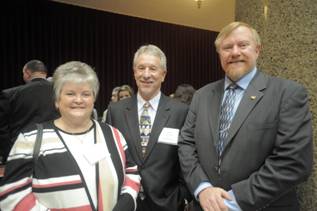when you start to get mad... you should do what I do!
Just tell yourself, Duckie, you're really quite lucky!
Some people are much more... oh, ever so much more...
oh, muchly much-much more unlucky than you!”
― Dr. Seuss
 At right: Nancy and Stan from the Area Agency on Aging while visiting the capitol.
At right: Nancy and Stan from the Area Agency on Aging while visiting the capitol.The taxpayers of Missouri work hard for their money, and the last thing they want their government to do during these tough economic times is waste their hard-earned tax dollars. For this reason, we have made protecting taxpayers one of the four pillars of our Blueprint for Missouri. This week, the Missouri House moved forward on this important issue by passing two bills, HB 1140 and HB 1135, which protect taxpayers.
During these times of budget shortfalls, many states across the nation have tried to plug their budget holes by raising taxes. Here in the House, we have a different philosophy. We have consistently worked to protect taxpayers by balancing the budget
 without raising taxes, by providing transparency about how your tax dollars are spent and by reducing regulations.
without raising taxes, by providing transparency about how your tax dollars are spent and by reducing regulations.At right: Presenting 3 young men with resolutions for their accomplishment of becoming Eagle Scouts: Luke Seidl, Lewis and Aaron Surgi, Scout Master David Surgi and daughter Samantha Surgi.
Taxpayers pay the bills of state government, and, without them, we couldn’t provide the vital services needed for economic development or educating our children. However, during these difficult times, we must hold all levels of government accountable to the taxpayer to ensure that your tax dollars are being used wisely. That is why we are working to increase transparency at the local level and review antiquated regulations on the books of our state agencies.
An informed citizenry is the best way to keep government from growing too large and unmanageable. But information about local government entities can often be difficult to find. HB 1140 holds local governments accountable by making local information accessible to every taxpayer.
Currently, information about state spending is available online at the Missouri Accountability Portal. HB 1140 requires counties and schools to submit their debts and holdings to the Office of Administration for posting on the portal. This gives taxpayers a one stop shop for tracking how their state and local tax dollars are being spent, expanding the information available to them.
HB 1135 improves transparency by requiring the review of administrative rules. Over time, department rules become outdated or obsolete. By requiring these rules to be reviewed periodically, we can ensure that all agency rules are efficient and effective.
Under current law, rules can stay on the books of a state agency indefinitely. HB 1135 also requires all administrative rules to sunset after 10 years. By including the sunset provision, all rules will have to venture through the public comment process periodically, giving citizens a say in how our executive departments run.
Now, more than ever, we need to keep government as lean and efficient as possible so we can keep more money where it belongs, in the pockets of taxpayers. By improving transparency and government accountability, you can serve as a watchdog for government waste.
Thank you for allowing me to server as your representative in Jefferson City. If you have any questions, please feel free to give me a call or better yet, come by the capitol and visit for a while.
A Bit about the Budget!!!
Below is a summary of information about Missouri’s Fiscal Year (FY) 2013 budget, including an overview of the Governor’s expenditure reductions, revenue increases and spending proposals.
Economists are generally predicting a slow but steady recovery for the U.S. economy which is still struggling with unemployment at 8.5%. There is a positive sign with the four-week moving average of weekly initial unemployment claims falling and stabilizing below 400,000 since November. Missouri is fairing slightly better than the national economy with unemployment currently at 8.0%. Certainly this is an improvement when compared to the record unemployment of 9.6% a year ago.
With this in mind, forecasting state revenues for Missouri’s upcoming fiscal year has been challenging. The revised Consensus Revenue Estimate (CRE) for the current FY2012 is 2.7% or $7.301 billion Net General Revenue (GR) collections. The CRE agreed to by the House, Senate and the Governor for FY2013 is for GR to grow at a less than average rate of 3.9%. This would result in Net GR collections of $7.586 billion. This amount would return tax collections available for the budget to slightly above the actual collections for FY2009. The CRE for FY2013 would provide an increase in net collections of $285 million above the original CRE that use used to craft the FY2012 budget.
However, the FY2012 budget also has more than $500 million of one-time Federal Budget Stabilization Funds that are supporting current programs, including the K 1-12 School Foundation Formula. These funds will not be available for the FY2013 budget. In addition, there are a number of mandatory increases in FY2013 which will require the commitment of GR funds such as the need for a $90 million increase in the state’s match rate for our Medicaid program.
The Governor’s proposed budget includes: carrying over funds, reductions, eliminations, cost containments, administrative savings, debt refinancing, generation of additional revenues from debt collections, other revenue efficiencies, increased Gaming fees and a tax amnesty plan. Approximately $88.7million of these enhanced revenue proposals will require additions and/or changes to current state statutes.
The Governor’s FY2013 budget is balanced through the following components:
- $191.7 million savings through efficiencies and reallocations in the Medicaid program.
- $89.0 million reduction for 4-year higher education institutions. This is a 14% decrease from the appropriations for FY2012.
- $64.3 million in additional debt collections and other revenue efficiencies.
- $51.8 million increase from a tax amnesty plan.
- $41.0 million savings through debt restructuring.
- $29.3 million in reduced staff and administrative costs in state agencies.
- $16.9 million reduction for community and technical colleges, also a 14% decrease from the appropriations for FY2012.
- $15.0 million in additional lottery revenue through advertising and other Lottery Commission initiatives.
- $7.0 million reduction in biodiesel subsidy payments.
- $2.0 million reduction in local public health agency grants.
- $3.009 billion for the Foundation Formula, including an overall increase of $5.0 million with a General Revenue increase of $203.2 million needed in part to also offset lost Federal Budget Stabilization Funds.
- $99.8 million to provide funding for K-12 transportation at the same level allowed after the Governor’s $8.0 million expenditure restriction in FY2012 appropriation.
- $105.5 million to maintain available funding for the A+, Bright Flight, and Access MO Scholarship Programs, including a general revenue increase of $25.0 million to partially offset the loss of MOHELA funds.
- $23.6 million for a 2% salary increase for state employees, effective January 1, 2013.
- $14.9 million to maintain funding for the Customized Jobs Training Program.
- $4.0 million for innovations in science and technology as authorized in the Missouri Science and Innovation Reinvestment Act.
- $31.0 million of increased gaming fees to provide a more stable revenue source for the state’s seven veteran’s homes.




No comments:
Post a Comment